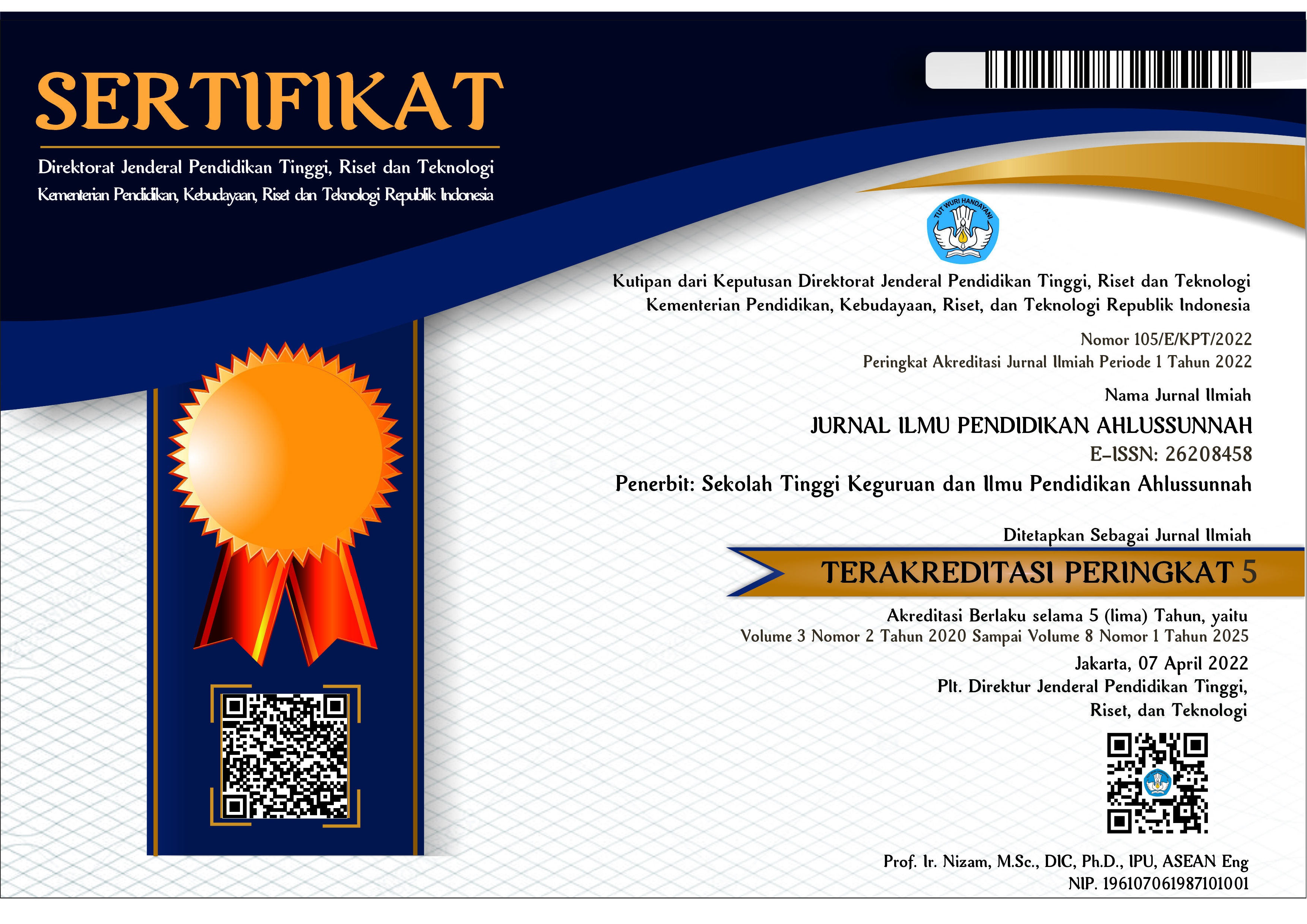MENGUNGKAP KARAKTER KERJASAMA SISWA SEKOLAH DASAR
.
Abstract
This research is a preliminary study, aimed at obtaining factual information on character education in cooperation with elementary school students in SDN 1 Sumurbandung, Lebak Regency. Research methods use quantitative research procedures. The results of the study obtained the practice of 2013 curriculum learning through the Cooperative Learning Model in its implementation is still oriented to the ability of students' knowledge and skills of students, while the ability of attitudes, especially the character of cooperation still requires a process of improvement based on research results where students are still weak in: Helping friends in need help (58.33%), Together in doing work (51.85%). Share task equipment with others (35.19%), Invite others in activities (30.56%), Say thank you (55.56%), Concentrate seriously (74.07%), Give advice in groups (49.07%), Feel happy to be part of a group (56.48%), Carry out activities designed by the leader (49.07%). Following the leader's direction (49.77%), Following the suggestion of improving cooperation (43.52%), Able to invite others to work together (55.56), Able to direct others to work together (57.41%), Overall ability to work with students with average grades the average of 52.91% is in the sufficient category, meaning that students are only sufficient in their ability to work together
References
Berkowitz, M. W., & Bier, M. C. 2005. What works in character education: A research-driven guide for educators. Washington, DC: Character Education Partnership.
Berkowitz, M. W., & Schwartz, M. 2004. Background and development. Partnership,1. Retrieved from http://www.nasponline.org/resources/intonline/NAS-CBIII-05- 1001-002-R02.pdf
Dolph, K., & Lycan, A. 2008. Moral Reasoning: A Necessary Standard of Instructional in Today’s Classroom. Journal of Cross-Disciplinary Perspectives in Education, 1, 13-19.
Durlak, J. A., Weissberg, R. P., Dymnicki, A. B., Taylor, R. D., & Schelinger, K. B. 2011. The impact of enhancing students’ social and emotional learning: A metaanalysis of school-based universal interventions. Child Development, 82(1), 405- 432
Edgington, W. D. 2002. To promote character education, use literature for children and adolescents [Electronic version]. Social Studies, 93(3), 113-117.
Elias, M. J. 2009. Social-emotional and character development and academics as a dual focus of educational policy. Educational Policy, 23(6), 831-846.
Farhan, dkk. 2017. Pengaruh Penerapan Pendidikan Karakter melalui Model Pembelajaran Student Teams Achievement Division Terhadap Hasil Belajar Pemeliharaan Mesin Kendaraan Ringan SMK Pancasila Surakarta. Jurnal Jiptek 2(2): 47-55.
Hamdani. 2011. Strategi Belajar Mengajar. Bandung : Pustaka Setia.
Jackson, Philip. Wesley. 1990. Life in classrooms (2nd ed.). New York: Teachers College Pres.
Koesoema A, Doni. 2007. Pendidikan Karakter Strategi Mendidik Anak di Zaman global. Jakarta: Gramedia Widiasarana Indonenesia.
Leverett, L. 2006. The fundamental connection of social-emotional learning/emotional intelligence, academic performance, and the process of learning. Introduction in M. J. Elias & H. Arnold (Eds.), The educator’s guide to emotional intelligence and academic achievement (pp. 1-2). Thousand Oaks, CA: Corwin Press.
Lickona, Thomas. (1992). Educating for character: How our schools can teach respect and resposibility. New York: Bantam Books.
Lickona, Thomas. (2001). What is good character? Reclaiming Children and Youth, 9(4), 239- 251. Retrieved from http://search.proquest.com/docview/214194284?accountid=2687
Lie, Anita. 2007. Cooperative Learning. Jakarta: Grafindo.
NCRL.2003. The North Central Regional Educational Laboratory, “enGauge 21st Century Skills: Helping Students Thrive in the Digital Age.
PPRC. 2010. Pacific Policy Research Center, “21 st Century Skills for Students and Teachers. Kamahemahe Sch. Res. Eval : 1–25.
Ryan, Kevin., & Bohlin, Karen. E. 1999. Building character in schools: Practical ways to bring moral instruction to life (ERIC Docu¬ment Reproduction Service No. ED423501).
Slavin, Robert. 2014. Cooperative Learning and Academic Achievement: Why Does Groupwork Work? Anales de Psicologia, 30: 785-791.
Supriyono, Agus. 2011. Cooperative Learning (Teori dan Aplikasi Paikem). Yogyakarta: Pustaka Pelajar.
Van Velsor, P. 2009. Task groups in the school setting: Promoting children’s social and emotional learning. Journal for Specialists in Group Work, 34(3), 276-292.
Yuristia, Adelina. 2017. Keterkaitan Pendidikan, Perubahan Sosia Budaya, Modernisasi dan Pembangunan, Ijtimaiyah Jurnal Ilmu Sosial dan Budaya1(1): 1–17.
Zins, J. E., Bloodworth, M. R., Weissberg, R. P., & Walberg, H. J. 2007. The scientific base linking social and emotional learning to school success. Journal of Educational and Psychological Consultation, 17(2/3), 191-210.
















